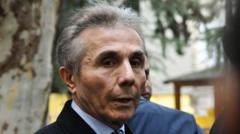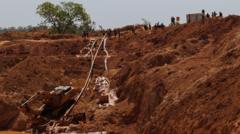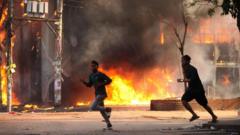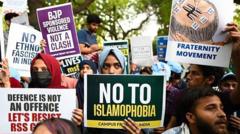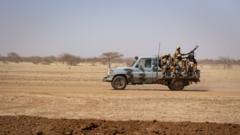Ghana, renowned for its gold and cocoa exports, faces ecological disaster as illegal mining proliferates, polluting rivers and threatening agriculture, while government responses remain contentious.
**Toxic Gold: Ghana's Illegal Mining Crisis and Environmental Catastrophe**
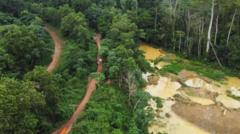
**Toxic Gold: Ghana's Illegal Mining Crisis and Environmental Catastrophe**
A surge of illegal gold mining in Ghana is causing severe environmental damage and sparking public unrest. Activists and artists highlight pollution's toll on communities, prompting calls for government action.
In the heart of West Africa, Ghana is grappling with an alarming crisis precipitated by illegal gold mining, known locally as "galamsey," which threatens both the environment and public health. Once pristine rivers, like the Pra River, are now thick with toxic pollutants, with some artists, such as Israel Derrick Apeti, using the discolored water as paint to draw attention to this grim reality. As a major gold exporter, the country is now witnessing a public outcry fueled by rising pollution levels and adverse effects on local livelihoods.
The rise of illegal mining has been exacerbated by an influx of capital and expertise from foreign investors, particularly from China, who have turned rudimentary practices into large-scale operations. This aggressive pursuit of gold has led to the destruction of agricultural land—over 4,726 hectares, which is comparable to the area of major European cities have been affected—prompting farmers to struggle amidst an increasing lack of viable water for irrigation.
Public demonstrations demanding government intervention reflect a growing frustration among citizens who witness firsthand the devastating impacts of mining on their communities. The hashtag movements #stopgalamseynow and #freethecitizens have resonated, particularly with younger Ghanaian populations who seek accountability and action. Coinciding with this unrest, the artistic community has risen to the occasion, using their platform to advocate for environmental preservation and highlight the health risks posed by mercury contamination—concerns echoed by environmental experts who warn of long-term consequences for both ecosystems and human health.
Government responses have been mixed; while some arrests of illegal miners have taken place, critics argue these actions are symbolic at best. Supporters of the ruling National Peoples Party express concern about alienating voters from mining districts, revealing the complicated intersection of economics, politics, and environmental policy. The President’s recent orders for law enforcement to escalate interventions seem insufficient to these communities that fear the persistent power of illegal markets while witnessing detrimental shifts in both local ecosystems and economies.
As Ghana stands at a critical juncture, the challenge remains for local leaders to reconcile the urgent need for environmental protection with the economic realities of impoverished communities. The ongoing fight against illegal mining is not just about gold but also about the future of many generations and the survival of Ghana's cherished natural resources. The voices of protesters, artists, and concerned citizens continue to resonate, signaling a collective demand for change that the nation's leadership cannot ignore.
The rise of illegal mining has been exacerbated by an influx of capital and expertise from foreign investors, particularly from China, who have turned rudimentary practices into large-scale operations. This aggressive pursuit of gold has led to the destruction of agricultural land—over 4,726 hectares, which is comparable to the area of major European cities have been affected—prompting farmers to struggle amidst an increasing lack of viable water for irrigation.
Public demonstrations demanding government intervention reflect a growing frustration among citizens who witness firsthand the devastating impacts of mining on their communities. The hashtag movements #stopgalamseynow and #freethecitizens have resonated, particularly with younger Ghanaian populations who seek accountability and action. Coinciding with this unrest, the artistic community has risen to the occasion, using their platform to advocate for environmental preservation and highlight the health risks posed by mercury contamination—concerns echoed by environmental experts who warn of long-term consequences for both ecosystems and human health.
Government responses have been mixed; while some arrests of illegal miners have taken place, critics argue these actions are symbolic at best. Supporters of the ruling National Peoples Party express concern about alienating voters from mining districts, revealing the complicated intersection of economics, politics, and environmental policy. The President’s recent orders for law enforcement to escalate interventions seem insufficient to these communities that fear the persistent power of illegal markets while witnessing detrimental shifts in both local ecosystems and economies.
As Ghana stands at a critical juncture, the challenge remains for local leaders to reconcile the urgent need for environmental protection with the economic realities of impoverished communities. The ongoing fight against illegal mining is not just about gold but also about the future of many generations and the survival of Ghana's cherished natural resources. The voices of protesters, artists, and concerned citizens continue to resonate, signaling a collective demand for change that the nation's leadership cannot ignore.


